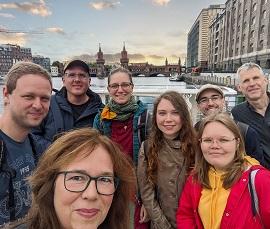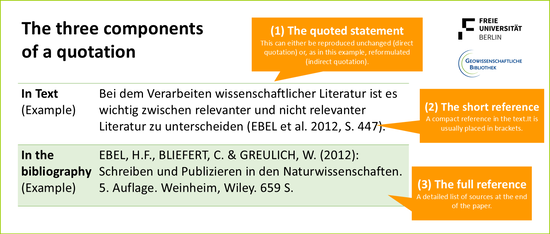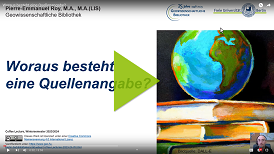Department of Earth Sciences
Service Navigation
Index
Citing at the Institute of Geographical Sciences
Your Library-Team

This is how we look like ;-)
Questions, concerns, suggestions? Feel free to contact us.
We can also arrange an appointment for more complex enquiries.
Address:
Malteserstr. 74-100, 12249 Berlin
Phone number: +49 30 838-70205
E-Mail: geolib@zedat.fu-berlin.de
Newsletters & Social Media
Newsletter of the Earth Sciences Library
UBtoDate - Newsletter of the University Library of the Freie Universität Berlin
Biblioblog - Blog of the Libraries of the Freie Universität Berlin
Citing at the Institute of Geographical Sciences
The citation style of the Institute of Geographical Sciences is described in chapters 5.4 and 5.6 of the "Recommendations for the preparation of theses (in German)".
For managing your references, we recommend using reference management tools such as Citavi and Zotero – both are free to use (Citavi is available through a campus license for FU members; Zotero is freely available to everyone). EndNote is currently also available via a campus license, but this license will expire on April 14, 2025, and will not be renewed. If you are currently using EndNote, please make sure to back up your data in time and familiarize yourself with alternative tools.
>> Tip: Do you use Zotero? Then download the Zotero citation style "Freie Universität Berlin - Geographische Wissenschaften" here!
Frequently asked questions
1. Do I have to cite my source again after each sentence? Or is a citation at the end of the paragraph sufficient?
2. What if there is no suitable citation template for my source?
>> Send us your questions by e-mail!
Citation examples
Note: All templates and examples are based on the "Recommendations for the preparation of theses (in German)" of the Institute of Geographical Sciences and are to be understood as recommendations. This citation method leaves a little room for variation - a reference may therefore be created in slightly different ways.
Short reference (in the text)| Case | Example |
| 1 Author | (LEE 2022) |
| 2 Authors | (ROY & SMITH 2015) |
| 3 or more authors | (MARTIN et al. 2018) |
| With page reference |
(LEE 2022, S. 86-87) Note: A page reference is required for direct quotations. |
| Corporate body | (STATISTISCHES BUNDESAMT 2012) |
| Corporate body (with abbreviation) |
|
| Narrative citation |
"HOCHSTENBACH and MUSTERD (2021) demonstrate in their study, how [...]" Note: In the case of so-called "narrative citations", the author's name and, if applicable, the year are part of the continuous text. |
1. Monograph
AUTHOR*S (year of publication): title of the monograph. subtitle (if applicable). edition (if not first edition). place(s) of publication, publisher. total number of pages. DOI or URL (if applicable)
STEGER, M. B. (2020): Globalization. A very short introduction. 2. Auflage. Oxford, Oxford University Press. 151 S.
VANNINI, P. (2024): Mobilities in remote places. Milton, Routledge. 244 S. https://doi.org/10.4324/9781003321163
1.1. Monograph (part of a series)
AUTHOR*S (year of publication): title of the monograph. subtitle (title of the series and the volume number, if applicable). edition (if not first edition). place(s) of publication, publisher. total number of pages. DOI or URL (if applicable)
SMITH, M. J., PARON, P. & GRIFFITHS, J. S. (2011): Geomorphological mapping. Methods and application (Developments in Earth surface processes 15). Amsterdam, Elsevier. 612 S.
2. Edited volumes (several contributions from different authors collected in one book)
EDITOR*S (Ed.) (year of publication): title of the edited volume. subtitle (title of the series and the volume number, if applicable). edition (if not first edition). place(s) of publication, publisher. total number of pages. DOI or URL (if applicable)
GLATTER, J. & MIEßNER, M. (Hrsg.) (2021): Gentrifizierung und Verdrängung. Aktuelle theoretische, methodische und politische Herausforderungen (Interdisziplinäre Wohnungsforschung 3). Bielefeld, Transcript Verlag. 396 S. https://doi.org/10.1515/9783839455821
Note: Complete edited volumes are rarely cited. It is more common to cite only the essay that you have used. See the next example.
2.1. Essay from an edited volumes
AUTHOR*S (year of publication): title of the essay. subtitle (if applicable) In: EDITOR*S (Ed.) (year of publication): title of the edited volume. subtitle (title of the series and the volume number, if applicable). edition (if not first edition). place(s) of publication, publisher. page numbers of the essay. DOI or URL (if applicable)
ÜBLACKER, J. (2021): Der Gentrifizierungseffekt. Situationslogik der Aufwertung von Wohngebieten. In: GLATTER, J. & MIEßNER, M. (Hrsg.): Gentrifizierung und Verdrängung. Aktuelle theoretische, methodische und politische Herausforderungen (Interdisziplinäre Wohnungsforschung 3). Bielefeld, Transcript Verlag. S. 187-208. https://doi.org/10.1515/9783839455821
3. Article from a journal
AUTHOR*S (year of publication): title of the essay. subtitle (if applicable). journal title and year (issue number if applicable). page numbers of the article. DOI or URL (if applicable)
CARMALT, J. C. (2018): For critical geographies of human rights. Progress in Human Geography 42 (6). S. 847-861. https://doi.org/10.1177/0309132517723720
4. Internet address (resp. website)
AUTHOR*S (year of publication): title of the site. subtitle (if applicable). URL (access date).
KRONAUER, M. (2018): Gentrifizierung: Ursachen, Formen und Folgen. https://www.bpb.de/themen/stadt-land/stadt-und-gesellschaft/216871/gentrifizierung-ursachen-formen-und-folgen/ (07.02.2024).
STATISTICS CANADA (2018): Freshwater in Canada. A look at Canada's freshwater resources from 1971 to 2013. https://www150.statcan.gc.ca/n1/pub/11-627-m/11-627-m2018011-eng.htm (07.02.2024).
Note: A corporate body can be considered an author.
5. Map
AUTHOR*S (year of publication): title of the map. subtitle (if applicable). type of map. scale. edition. place. DOI or URL (if applicable)
LANDESVERMESSUNGSAMT SACHSEN (2000): Hohnstein-Ulbersdorf. Blatt 5051-NW. Topographische Karte. 1:10.000. 2. Auflage. Dresden.
6. University publication
AUTHOR*S (year of publication): title of the university publication. subtitle (if applicable). type of university publication. place of publication, university. total number of pages. DOI or URL (if applicable)
MCLAUGHLIN, F. (2014): Using regional flow regime classes to identify flow anomalies in a set of Canadian rivers regulated by dams. Dissertation. Montreal, McGill University. 130 S. https://escholarship.mcgill.ca/concern/theses/r494vp21q?locale=en
7. Online report
AUTHOR*S (year of publication): title of the report. subtitle (if applicable). edition (if not first edition). place(s) of publication, editing corporate body. total number of pages. DOI or URL (if applicable)
ABU OUDEH, A. (2023): The two-state solution and its dual significance for the Palestinian people and the Hashemite kingdom of Jordan. 2. Auflage. Amman, Friedrich Ebert Stiftung Jordan & Iraq. 18 S. https://library.fes.de/pdf-files/bueros/amman/20929.pdf
8. Dataset
AUTHOR*S (year of publication): title of the data set. subtitle (version) (if applicable). data set. place(s) of publication, editing corporate body. DOI or URL if applicable)
JINGTING, F. (2019): Replication data for: Internal Geography, Labor Mobility, and the Distributional Impacts of Trade (Version V1). Datensatz. OpenICPSR. https://doi.org/10.3886/E116401V1
Video-Tutorials
What does a reference consist of? (in German) [3:01]
What is a DOI? (in German) [2:27]
Reference management programmes in comparison (in German) [16:11]
More Information
Educational ressources offered by the University Library (citation consultation, coaching, etc.)
Recommended reading: Cite Them Right (PEAR & SHIELDS 2022)
>> Tip: Take a look at the Coffee Lectures of the Earth Sciences Library! There are often presentations on how to cite in the geosciences.






